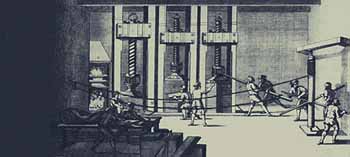|

- An Inquiry
into the Nature and Causes
of the Wealth of Nations
(1776)
______________________
- Title of volume I
Introduction and Plan of the Work
- B o o k O n e
Of the Causes of Improvement in the productive Powers of Labour, and of the Order according to which its Produce is naturally distributed among the different Ranks of the People
- Chapter I.
Of the Division of Labour
Chapter II.
Of the Principle which gives Occasion to the Division of Labour
Chapter III.
That the Division of Labour is limited by the Extent of the Market
Chapter IV.
Of the Origin and Use of Money
Chapter V.
Of the real and nominal Price of Commodities, or of their Price in Labour, and their Price in Money
Chapter VI.
Of the component Parts of the Price of Commodities.
Chapter VII.
Of the natural and market Price of Commodities
Chapter VIII.
Of the Wages of Labour
Chapter IX.
Of the Profits of Stock
Chapter X.
Of Wages and Profit in the different Employments of Labour and Stock
Chapter XI.
Of the Rent of Land
- Part 1.
Of the Produce of Land which always affords Rent
Part 2.
Of the Produce of Land which sometimes does, and sometimes does not, afford Rent
Part 3.
Of the Variations in the Proportions between the respektive Values of that Sort of Produce which always affords Rent, and of that which sometimes does and sometimes does not afford Rent
Digression concerning the Variations in the Value of Silver during the Course of the Four last Centuries
Variations in the Proportion between the respective Values of Gold and Silver
Grounds of the Suspicion that the Value of Silver still continues to decrease
Different Effects of the Progress of Improvement upon the real Price of three different Sorts of rude Produce
Conclusion of the Digression concerning the Variations in the Value of Silver
Effects of the Progress of Improvement upon the real Price of Manufactures
Conclusion of the Chapter
- Tables
- B o o k T w o
Of the Nature, Accumulation,
and Employment of Stock
- Introduction
Chapter I.
Of the Division of Stock
Chapter II.
Of Money considered as a particular Branch of the general Stock of the Society, or of the Experience of maintaining the National Capital
Chapter III.
Of the Accumulation of Capital, or of productive and unproductive Labour
Chapter IV.
Of Stock lent at Interest
Chapter V.
Of the different Employment of Capitals
- B o o k T h r e e
Of the different Progress of Opulence
in different Nations
- Chapter I.
Of the Natural Progress of Opulence
Chapter II.
Of the Discouragement of Agriculture in the ancient State of Europe after the Fall of the Roman Empire
Chapter III.
Of the Rise and Progress of Cities and Towns, after the Fall of the Roman Empire
Chapter IV.
How the Commerce of the Towns contributed to the Improvement of the Country
- B o o k F o u r
Of Systems
of political Oeconomy
- Introduction
Chapter I.
Of the Principle of the commercial, or mercantile System
Chapter II.
Of Restraints upon the Importation from foreign Countries of such Goods as can be produced at Home
Chapter III.
Of the extraordinary Restraints upon the Importation of Goods of almost all Kinds, from those Countries with which the Balance is supposed to be disadvantageous
- Part 1: Of the Unreasonableness of those Restraints even upon the Principles of the Commercial System
Digression concerning Banks of Deposit, particularly concerning that of Amsterdam
Part 2: Of the Unreasonableness of those extraordinary Restraints upon other Principles
- Chapter IV.
Of Drawbacks
Chapter V.
Of Bounties
- Digression concerning the Corn Trade and Corn Laws
Appendix on the Herring Bounty
- Chapter VI.
Of Treaties of Commerce
Chapter VII.
Of Colonies
- Part 1: Of the Motives for establishing new Colonies
Part 2: Causes of Prosperity of new Colonies
Part 3: Of the Advantages which Europe has derived from the Discovery of America, and from that of a Passage to the East Indies by the Cape of Good Hope
- Chapter VIII.
Conclusion of the Mercantile System
Chapter IX.
Of the Agricultural Systems, or of those Systems of Political Oeconomy, which represent the Produce of Land, as either the sole or the principal Source of the Revenue and Wealth of every Country
- B o o k F i v e
Of the Revenue of the Sovereign
or Commonwealth
- Chapter I.
Of the Expences of the Sovereign or Commonwealth
- Part 1.
Of the Expence of Defence
Part 2.
Of the Expence of Justice
Part 3.
Of the Expence of Public Works and Public Institutions
Article 1st.
Of the Public Works and Institutions for facilitating the Commerce of Society
Article 2d.
Of the Expence of the Institutions for the Education of Youth
Article 3d.
Of the Expence of the Institutions for the Instruction of People of all Ages
Part 4.
Of the Expence of supporting the Dignity of the Sovereign
Conclusion of the Chapter
- Chapter II.
Of the Sources of the general or public Revenue of the Society
- Part 1.
Of the Funds or Sources of Revenue which may peculiarly belong to the Sovereign or Commonwealth
Part 2.
Of Taxes
Article 1st.
Taxes upon Rent; Taxes upon the Rent of Land
Taxes which are proportioned, not to the Rent, but to the Produce of Land
Taxes upon the Rent of Houses
Article 2d.
Taxes upon Profit, or upon the Revenue arising from Stock
Taxes upon the Profit of particular Employments
Appendix to Articles 1st and 2d.
Taxes upon the Capital Value of Lands, Houses, and Stock
Article 3d.
Taxes upon the Wages of Labour
Article 4th.
Taxes which, it is intended, should fall indifferently upon every different Species of Revenue
Capitation Taxes
Taxes upon consumable Commodities
- Chapter III.
Of public Debts
|